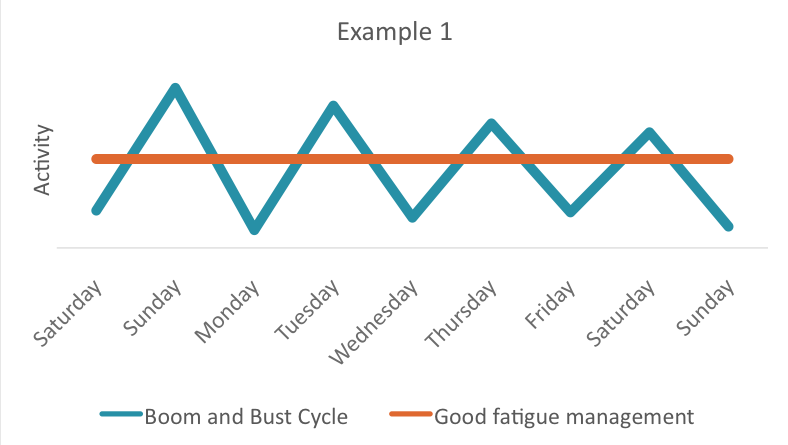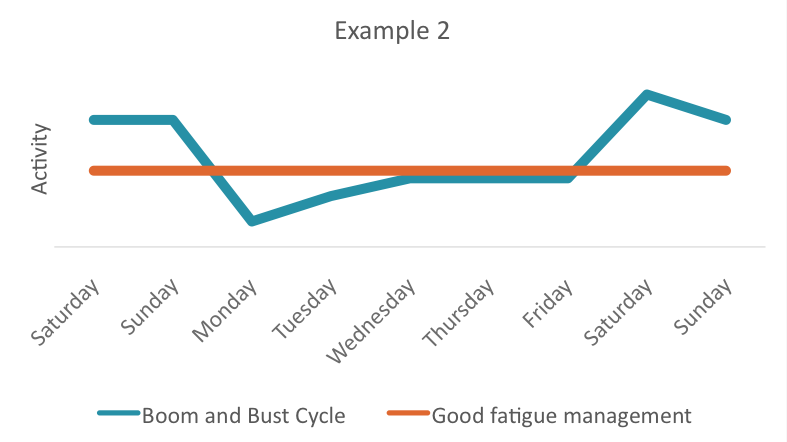Fatigue is a word that we use to describe the feeling of tiredness.
Information on Fatigue
Fatigue is a word that we use to describe the feeling of tiredness. There are two main types of fatigue:
Physical fatigue
This is where your body gets tired after you do physical work. In the very early stages of recovery, even simple things like having a shower or walking to the dining room might exhaust you, because you have been in bed for so long.
This fatigue normally gets better fairly quickly as you start doing more and your body gets used to it again.
Mental fatigue
This is where your brain gets tired. It can happen when you do a lot of thinking or concentrating (for example, sitting in the Brain Interest Group for an hour). It is sometimes hard to notice here at ABI Rehabilitation because there is a lot of structure in place and we normally schedule things so that you get a break between activities.
This fatigue may last for a lot longer and it is important to manage it well to make sure you can get on with the things that are important to you.
Everyone’s signs of fatigue might be a bit different, but most of them fall into three different categories (click to expand):
Fatigue is a very common issue after brain injury, and it is something that people can live with for many years. Up to 75% of people with a brain injury still experience some level of fatigue after 5 years.
If fatigue is not managed well, it can cause the difficulties mentioned above and keep them around for the long-term.
It is very important that you start to recognise your own signs of fatigue so that you can do something about them.
The ‘boom and bust’ cycle is one where you do too much when you are feeling fine, and then too little afterwards while you need time to recover.
Boom and Bust Cycle


Frequently asked questions about fatigue
What can I do about fatigue?
People can do all sorts of things to try and manage their fatigue. Some things really help fatigue, and some things can make it worse.
Below is a list of strategies that might be useful at different times of the day. Different things are useful for different people. You might have other ideas about what is useful for you – discuss these with your therapists and loved ones.
DO
- Try to wake up and get out of bed at the same time every morning.
- Eat healthy and regularly to give your body energy
- Try to stick to a routine where you can
- Take a bit of time to plan your activities for the day
– What is most important?
– What will take the most energy?
– What can wait for another time?
– What do I want to do the most? - Schedule in some time for a short sleep or something relaxing, as well as some gentle exercise (e.g. going for a walk)
- Remember that you might need to give yourself more time to carry out tasks
DON’T
- Use too much caffeine or sugar to keep you going
- Keep pushing through even when you know you are getting tired
DO
- Set aside time to unwind or relax before bed
- Get into regular routines, e.g. cup of herbal tea, hot bath before bed
- Go to bed when you start feeling sleepy
- Try to put aside any worries you have about things that happened in the day, or things you have to do tomorrow
DON’T
- Do anything too physically active or eat a heavy meal at least 2 hours before bed
- Read or watch anything too stimulating
DO
- Make sure your bed is comfortable
- make sure your bedroom is quiet, dark, and a good temperature
- Get up and do something quiet and boring if you can’t get to sleep within 10-20 minutes
DON’T
- Watch TV in bed
- Try too hard to fall asleep, or get angry if you can’t
